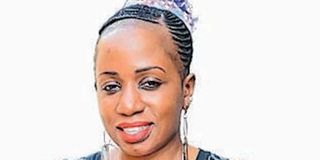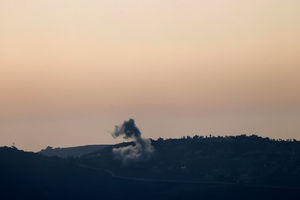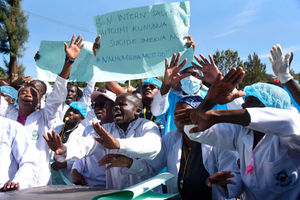She earned her PhD at just 28!

Dr Alice Nabatanzi PHOTOI NMG
What you need to know:
- She proudly tells an enviable tale without the usual abyss-to-bliss challenges synonymous with most success stories in Africa. “I don’t have those emotional stories. I did not face challenges as such,” she said with reasonable content. “God planned my story well.” While most return to the lecture room under the pressure to consolidate our job positions or win promotions, Dr Nabatanzi’s rise was different and swift. After her Bachelor’s in Ethnobotany in 2011, she immediately enrolled for her Master’s in Natural Products Technology and Value Chains. She had no sooner finished her Master’s in 2014 than she started her doctorate in Natural Products, (Phytochemistry and Nutraceuticals) which she accomplished in 2017.
Dr Alice Nabatanzi is not just a pretty face, though. Last year, the lecturer at Makerere University’s College of Natural Sciences earned her PhD aged only 28.
She proudly tells an enviable tale without the usual abyss-to-bliss challenges synonymous with most success stories in Africa. “I don’t have those emotional stories. I did not face challenges as such,” she said with reasonable content. “God planned my story well.” While most return to the lecture room under the pressure to consolidate our job positions or win promotions, Dr Nabatanzi’s rise was different and swift. After her Bachelor’s in Ethnobotany in 2011, she immediately enrolled for her Master’s in Natural Products Technology and Value Chains. She had no sooner finished her Master’s in 2014 than she started her doctorate in Natural Products, (Phytochemistry and Nutraceuticals) which she accomplished in 2017.
Dr Nabatanzi chose science because “in science you are dealing with facts. You prove them or dispute them; not the complicated stories of wars that happened before we were born.”
But even sciences like anthropology, genetics delve into history of humans and their environments, I reminded her. She insisted: science is easier.
Dr Nabatanzi was introduced to university science while working at the College of Engineering in her Form Six vacation.
“From Standard One, dad gave us over 100 mathematical numbers to solve every holiday.
That is how we got used to mathematics.” No wonder, all her brothers pursued sciences: one is doing his Master’s in engineering, in India, another graduated in commerce and their last born, in his A’ Level is offering a science combination.
At school, Dr Nabatanzi was always among the best. Even at university, she said, her CGPA never went below 4. She was also into leadership: timekeeper, counsellor, deputy head girl, and church usher.
Mentorship
Dr Nabatanzi describes her mother as “a very strong woman with a big heart for helping others,” a mentor of sorts. When Ssempala died in 2003, their last born was only in Primary Six. Annet Florence Ssempala, a typical stay-home mother, quit her comfort zone and took on the mantle as the sole head of the family.
Granted, she did not begin from scratch because her deceased husband had invested in a big school and other property such as land. But her choice not to remarry and her ability to manage her husband’s estate, oversee the academic advancement of their five children is why Dr Nabatanzi has great admiration for her.
Significance
Medicine was her first choice but after 10 years at university, she believes that “finding scientific solutions to key problems affecting society like maternal and infant mortality; malnutrition among mothers, children, and people living with HIV is the most beneficial research one can ever do.”
To drive her point home, she drew me into her PhD research about nutrition for pregnant mothers in rural areas. The study “justifies the nutraceutical significance of Wild Edible Plants and their ability to meet the maternal pregnancy nutrient requirements.”
She mentioned physalis peruviana (gooseberry), raspberries wild tomatoes, wild mushrooms, yams, among others as foods rich in vitamins, iron, proteins, folic acid, carbohydrates, vital to the mother’s and foetal health.
She recommends these foods as “the best option to improve the dietary quality and quantity of marginalized rural pregnant women because of their availability, accessibility, affordability and sustainability.”
Indigenous knowledge about such foods is passed on from generation to generation and the role of scientists like Dr Nabatanzi is to subject it to test to either validate it or dismiss it—and disseminate the findings to the respondent communities. She is cynical of the ‘wannabe nutritionists’ and herbalists who enjoy vast media space yet their knowledge is based on mere assumptions.
Some of the women in Nakisunga, Namayuba in Mukono and Buikwe where she did her survey, picked the idea.
Dr Nabatanzi admits that the prevalent Westernisation of African societies is greatly eroding this valuable knowledge and promoting bad nutritional habits “but we can preserve the remaining knowledge by documenting it.”
Recognition
Dr Nabatanzi has been lucky that her postgraduate education was fully sponsored by the Carnegie Co-operation of New York through the Science Initiative Group under the Regional Initiative in Science and Education for African Natural Products Network (Rise-Afnnet).
Last month Dr Nabatanzi was the only Ugandan among the 28 African participants having been selected by virtue of having a PhD before 35. The EuroScience Open Forum (ESOF) in Toulouse, France is the largest interdisciplinary science meeting in Europe dedicated to scientific research and innovation.
Since 2004 the biennial forum brings together over 4000 researchers, educators, business actors, policy makers and journalists from all over the world to discuss breakthrough.




